Is there any hope for the Left?

Television talk shows have become a forum of immense discussion and interest amongst the politically engaged population in Bangladesh—and, to a large extent, one of the only remaining forums for oppositional leaders, civil society intellectuals and social activists to get their points across to the public. The concerns regarding the ever-shrinking political space for those who question the rule of the ruling party, are issues to which this country is alarmingly getting accustomed to. Perhaps, it is because of the tangible developmental successes of the current regime, or the acceptance of Awami League's strengthened political position, that Bangladeshis have become habituated to the fragile democracy in Bangladesh.
In such regard, leftist political organisations have failed, or in better words, been unable to promote the niche political dynamism needed to attract citizens towards their agendas. Unfortunately, leftist leaders in our country remain in the periphery of such TV talk shows, and unlike the traditional reach of the two major parties across the Bangladeshi diaspora, the reach of the Left remains low and unconvincing.
Bangladesh's tryst with the Left has been an interesting one. The Awami League itself was founded on certain core leftist principles, including the tenet of socialism which has been enshrined in our Constitution. From Maulana Bhashani to ASM Abdur Rab, Bangladesh has seen leftist politicians playing prominent roles across important moments in our history. In the Ershad-era, a comprehensive leftist platform comprising of the Communist Party of Bangladesh, Workers Party and JASAD amongst others, actively supported the BNP and the Awami League in their quest to oust then President HM Ershad. Having previously played such an active role in our politics, what then explains the state of the Left in our politics today?
Well, for one, pre-1990s Bangladesh saw political parties practise idolisation. While General Ziaur Rahman and General HM Ershad did indeed practise the politics of ideological compromise to establish their legitimacies as political leaders, thereby bringing together forces from the left, right and centre under one banner, they undoubtedly created a problematic hole in Bangladeshi politics.
Following the election of Begum Khaleda Zia as prime minister in 1991, this nation saw its leftist icons, such as Rashed Khan Menon, Suranjit Sengupta and Hasanul Huq Inu, aligning themselves with the ruling elites. When left-leaning parties, platforms and individuals started to move away from the very principles of anti-establishment politics that they historically cherished, Bangladesh slowly moved towards the era of power politics, and departed from their traditional ideologies. Today, we witness the politics of compromise and power on a whole new scale, a situation which has ensured that iconic leftist leaders serve in the party which they vociferously criticised throughout their political careers.
For one, left-leaning parties have their own share of blame as well. We all know about the role of JASAD during the era of Bangabandhu Sheikh Mujibur Rahman, and it is thus even more surprising to see the Founding Father's party induct them as cabinet members. On the other hand, the BNP and Jatiya Party, for example, have throughout their histories inducted many left-leaning leaders such as Mirza Fakhrul Islam Alamgir and Kazi Zafar Ahmed into their party platforms.
From the BNP and Awami League's side, these have been positive political developments, as integrating such leaders into mainstream political structures has ensured the eradication of prospective oppositional forums, at the cost of the severe and visible degradation of leftist politics in Bangladesh. Such, for our society, irrespective of whether one supports leftist principles, is a massive dent to the very idea of a democracy.
So, what next for the Left? One does not expect Rashed Khan Menon and Hasanul Huq Inu to distance themselves from the Awami League to establish a utopian leftist platform to win the next election. Hence, we look to the remaining parties. Given the current scenario in Bangladesh, the subtle, if not open, sympathy towards the BNP by other left-leaning groups such as the Communist Party of Bangladesh or Nagorik Oikko, is not necessarily surprising. But leaders of these parties have made it clear that they will not enter into a formal alliance with Begum Zia's party as long as Jamaat-e-Islami operates as an allied member of the BNP. Such is the sad tale of the pro-Liberation Left, that those forces which opposed the very birth of this country and rising right-wing elements such as Hefazat-e-Islam, mean more to our mainstream parties then they do. The failure of constructing a united leftist agenda, is a failure to which the Left has sadly gotten familiarised with.
Even in this darkness, however, there is a glimmer of hope. Young leaders such as Zonayed Saki gives us optimism that the decaying Left will play an important role in the future. He has spoken about crucial issues such as environmental protection, good governance and the rule of law, as being platform points for the upcoming elections. But this begs the question, do we really know or align with leftist political organisations beyond remembering the names of a few prominent politicians?
We unfortunately do not. And as such, individuals like Saki or Mujahidul Islam Selim have little to no alternative, then to unite leftist forums with party's like Badruddoza Chowdhury's Bikalpa Dhara or Dr Kamal Hossain's Gono Forum, to form a comprehensive third-platform for our citizens to consider. The individualistic nature of these parties means that the only way for such organisations to succeed, is if these prominent individuals contest the upcoming elections under one banner—and both Chowdhury and Kamal Hossain have already started this process.
The biggest problem with the Left in Bangladesh is that they do not have the resources or money that our bigger parties have to operate successfully in Bangladesh. This again is a sad reality that we have become used to. To win the hearts of the people and to re-establish the legitimacy of a declining and lacklustre Left, the only visible option for these parties remains in how they decide to go about the upcoming elections. As has been seen with the BNP, it is difficult to be an active political player without being in Parliament. Therefore, left-leaning parties must, for the sake of their future, try and gain entry into the parliamentary process.
The Left speaks well, the Left articulates their arguments well—but without having seats in Parliament or being the united ideological force that they once were, there is little to no hope for this brand of politics to survive in Bangladesh. The onus is on them, and we hope that they can prevail—for the sake of political diversity and for the sake of democracy.
Mir Aftabuddin Ahmed is a student of economics and international relations, University of Toronto, Canada.
Email: [email protected]





Comments